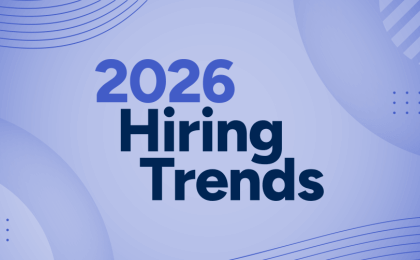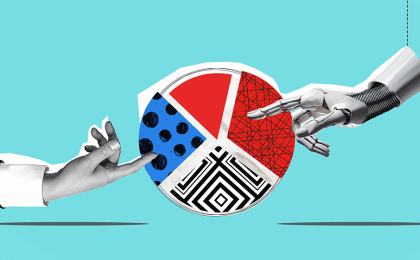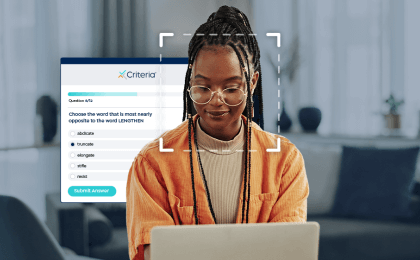In today’s digital hiring landscape, employers face growing concerns around candidate dishonesty - especially in an era where artificial intelligence (AI) tools like ChatGPT are easily accessible. From resume optimization to interview question prep, AI can be a valuable resource for job seekers. However, when it comes to assessments meant to objectively evaluate a candidate’s skills and fit, the inappropriate use of AI or other dishonest behaviors can undermine the integrity of the hiring process.
Criteria’s mission is to provide fair, secure, and reliable assessments that help organizations make better talent decisions. Here’s how we address cheating concerns in the age of AI at Criteria - and the robust measures we take to ensure that every candidate is evaluated on their true potential.
The Rise of AI and the Risk of Assessment Cheating
Remote assessments offer flexibility and convenience for candidates, but they also open potential pathways for misuse. As generative AI tools become more sophisticated, some hiring professionals fear that candidates could use them to complete assessments dishonestly or gain an unfair edge.
That’s why we’ve built a multi-layered approach to assessment security, designed not only to detect and deter cheating, but also to educate candidates on expectations and uphold the integrity of the hiring process.
How Criteria Prevents Cheating, Even With AI
1. Advanced Security Measures in Our Platform
Criteria integrates a variety of tools and safeguards to make it difficult for candidates to use AI assistance during assessments:
- Session Controls: Restrictions on copy-paste functionality and automatic lockouts if a candidate navigates away from the assessment window.
- Session Monitoring: Detailed logs capture behaviors such as time spent per question and flag unusual response patterns.
- Time-Limited Assessments: Ability tests like the CCAT, Cognify, and GAME are time-restricted, minimizing opportunities for external help.
- Dynamic & Adaptive Content: Assessments use item banking, randomized questions, and adaptive testing, ensuring that no two test experiences are alike.
- Real-Time Problem Solving: Tests like Cognify use interactive elements that AI tools cannot complete on behalf of the candidate.
- Aberrant Response Detection: Our system flags overly positive, inconsistent, or coached answers, particularly in personality and risk assessments.
2. Structured Interviewing & Interview Intelligence
Criteria’s Structured Interviewing platform helps ensure authentic candidate responses through thoughtful question design and controlled retake policies. For video interviews, limiting prep time and retakes discourages scripting or AI-generated answers.
Additionally, our Interview Intelligence (IIQ) platform scores responses based on BARS (Behaviorally Anchored Rating Scales) guides. Because these scoring criteria are unknown to candidates, using AI to fabricate responses would offer no real advantage.
Proctoring: A Critical Layer of Protection
To further enhance security (especially in remote or high-stakes assessments), Criteria offers a flexible AI-aware proctoring solution that verifies candidate authenticity at scale.
Key Features Include:
- Image Capture: Periodic snapshots verify the candidate’s presence.
- Image Analysis: Continuous facial recognition confirms it’s the same person throughout the test, and that they’re not using mobile devices.
- Screen and Audio Sampling: Records snippets of screen activity and ambient sound to detect unauthorized tools or outside help.
- Comprehensive Reporting: Transparent session logs and image results give employers a clear view of test integrity.
Best of all, these tools support high-volume hiring while maintaining a positive candidate experience across all devices: desktops, tablets, and mobile phones.
Best Practices for Employers to Prevent Cheating
While Criteria provides strong built-in security, employers can further support assessment integrity by:
- Clearly communicating their stance on the use of AI and dishonesty with candidates prior to any assessments.
- Customizing assessment landing pages and invitation emails to set expectations.
- Informing candidates about potential supervised re-testing.
- Using supervised testing options when extra validation is needed.
Educating candidates early about what's expected (and what constitutes a violation) can reduce the temptation to cheat and foster a culture of integrity from the start.
Criteria Balances Innovation with Integrity
AI is reshaping every corner of the workforce, including how people apply for jobs. At Criteria, we embrace innovation but remain steadfast in our commitment to fair, secure assessments. With proactive strategies, cutting-edge technology, and transparent communication, we’re helping organizations navigate the age of AI without compromising on quality or trust.
Want to learn more about our security and proctoring capabilities? Get in touch!





